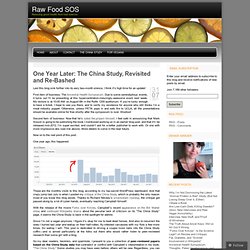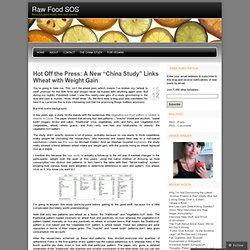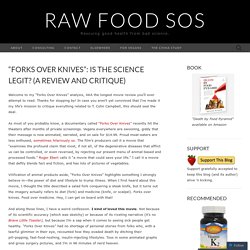

Attia/fats. Lustig/sugar. Rescuing good health from bad science. One Year Later: The China Study, Revisited and Re-Bashed. Lest this blog sink further into its eery two-month silence, I think it’s high time for an update!

First item of business: The Ancestral Health Symposium. Due to some serendipitous events, it turns out I’ll be presenting at this hyperventilation-inducingly-awesome event next week. My lecture is at 10:00 AM on August 6th in the Rolfe 1200 auditorium. If you’re lucky enough to have a ticket, I hope to see you there, and to verify my existence for anyone who still thinks I’m a meat industry puppet. Otherwise, unless PETA pops in and sets fire to UCLA, all the presentations should be available online for free shortly after the symposium is over. Second item of business: Now that he’s outed the project himself, I feel safe in announcing that Mark Sisson is going to be publishing the book I mentioned working on in an earlier blog post, and that it’ll be released mid-2012. Now on to the real point of this post. One year ago, this happened: But first, a few words on peer review Go figure! Hot Off the Press: A New “China Study” Links Wheat with Weight Gain.
You’re going to hate me.

This isn’t the wheat post, which means I’ve broken my “wheat is next” promise for the 80th time and should never be trusted with anything again ever. But during my nightly Pub(Med) crawl, I saw this nearly-new gem of a study glimmering in the dust and said to myself, “Wow. Wow! Wow.” By the third wow, a blog post was inevitable. But first, some background. A few years ago, a study hit the stands with the audacious title Vegetable-rich food pattern is related to obesity in China. The study didn’t exactly receive a lot of press, probably because no one wants to think vegetables make people fat (including the researchers, who hummed and hawed their way to a half-baked conclusion—check out this post by Michael Eades).
I mention this because the new study is actually a follow-up to the old one. I’m going to explain this study point-by-point before getting to the good stuff, because it’s a little complicated (but totally worth understanding). From the paper: Like this: “Forks Over Knives”: Is the Science Legit? (A Review and Critique) Welcome to my “Forks Over Knives” analysis, AKA the longest movie review you’ll ever attempt to read.

Thanks for stopping by! In case you aren’t yet convinced that I’ve made it my life’s mission to critique everything related to T. Colin Campbell, this should seal the deal. As most of you probably know, a documentary called “Forks Over Knives” recently hit the theaters after months of private screenings. Vegans everywhere are swooning, giddy that their message is now animated, narrated, and on sale for $14.99. Vilification of animal products aside, “Forks Over Knives” highlights something I strongly believe in—the power of diet and lifestyle to trump illness. And along those lines, I have a weird confession. But there’s a reason I’m a health blogger and not a film critic, and I realize not everyone likes to see coronary arteries slashed open or a hear slew of personal stories intended to pluck at our heartstrings. Why am I doing this? Word choice. You’re good men, Charlie Browns. War!